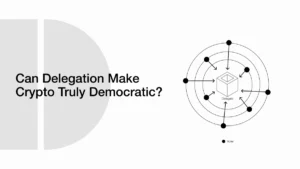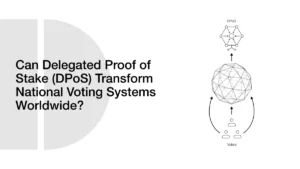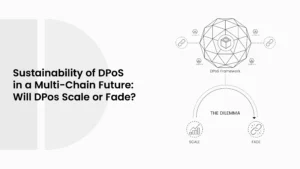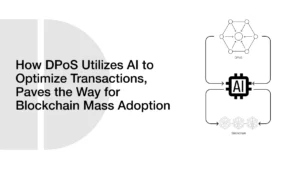How to Delegate Tokens on a DPoS Blockchain (Step-by-Step Guide)
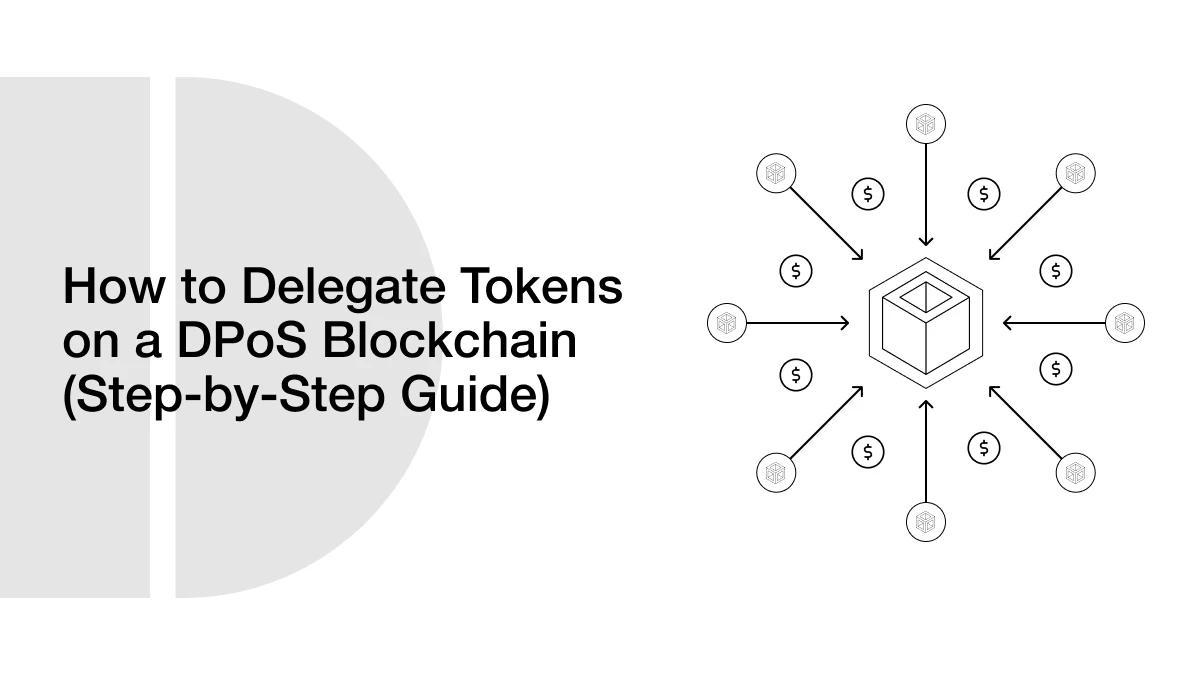
Delegated Proof of Stake (DPoS) is a mechanism implemented by certain blockchains to enhance their speed and efficiency. In contrast to conventional approaches, such as Proof of Work, which consume significant computational resources, DPoS relies on a limited number of trusted individuals, known as validators, to maintain the network’s operation. Token holders select these validators by delegating their tokens to them.
- DPoS Delegation in Popular Blockchains
- Step 1: Understand What It Means to Delegate Tokens
- Step 2: Get Ready with the Right Tools
- Step 3: Choose a Validator That Matches Your Goals
- Step 4: Delegate Your Tokens Using Your Wallet
- Step 5: Monitor Rewards and Validator Performance
- Step 6: Re-delegate or Withdraw If Needed
- Step 7: Understand Your Role in Supporting the Network
- Real-World Delegation Tips
- Final Thoughts
- FAQs
- Glossary of Key Terms
An increasing number of blockchains are now utilizing this system. For individuals holding tokens on a DPoS network, understanding how to delegate those tokens is crucial. It enables you to engage in the system, assist in maintaining network security, and receive rewards. This guide details every step of the process in straightforward terms, additionally addressing the significance of each step.
DPoS Delegation in Popular Blockchains
| Blockchain | Token | Min. Delegation | Reward Frequency | Unbonding Period | Re-delegation Allowed? |
| Cosmos | ATOM | None | Daily | 21 days | Yes |
| EOS | EOS | 1 EOS | Variable | None | Yes |
| Tezos | XTZ | 1 XTZ | Every 3 days | ~5 weeks | Yes |
| Polkadot | DOT | 10 DOT | Per Era (~24 hrs) | 28 days | No (requires unbonding) |
Step 1: Understand What It Means to Delegate Tokens
In a DPoS blockchain, delegation refers to granting someone else the authority to vote on your behalf. Instead of doing the work yourself, you allow a validator to use your voting power. You don’t give up ownership of your tokens; they stay in your wallet. You simply choose a validator to act on your behalf.
These validators are responsible for confirming transactions and creating new blocks. The more tokens they are delegated, the more influence they have. A validator’s performance affects how well the network runs and how much reward delegators receive. A 2020 study by Yu et al. in IEEE Access found that DPoS systems offer better performance than older models, but still rely heavily on active participation.
Step 2: Get Ready with the Right Tools
To delegate tokens, you must first have two essentials: the appropriate tokens and a wallet that enables delegation. For instance, if you wish to delegate on the EOS network, you must possess EOS tokens.
Next, you require a wallet compatible with the DPoS system. Certain blockchains possess their own official wallets. Some permit the use of reliable third-party wallets. The important aspect is that the wallet enables you to select validators and oversee your stake. It should also allow you to view your rewards and performance.
After acquiring the appropriate wallet and tokens, you can initiate the delegation process. However, you must first select a validator.
Step 3: Choose a Validator That Matches Your Goals
Selecting the appropriate validator is essential. Validators accomplish more than just processing transactions. They influence the distribution of rewards and the security of the network. A trustworthy validator must have excellent uptime (indicating they seldom go offline), minimal fees, and a solid reputation.
Certain validators deduct a minor fraction of the rewards as a charge. This is typical, but the proportion changes. Seek out validators known for their consistent fair conduct. A research paper by Zhang and Zhou (2022) on arXiv indicated that several DPoS networks are dominated by a limited number of validators. Backing smaller or more transparent validators can mitigate this risk. Once you’ve chosen a validator, you can proceed to delegate your tokens.
| Validator | Uptime % | Commission Fee | Community Involvement | Transparency |
| Validator A | 99.9% | 5% | Active on forums | Yes |
| Validator B | 97.8% | 2% | Unknown | No |
| Validator C | 100% | 10% | Maintains GitHub repo | Yes |
Step 4: Delegate Your Tokens Using Your Wallet
To assign tasks, access your wallet or the platform you are utilizing. A section for staking or delegation should be included. Locate the list of validators and select one. Subsequently, specify the number of tokens to delegate and verify the action.
The tokens remain in your wallet, but your voting strength is now measured with the validator. Depending on the network, the delegation may take several minutes or several hours to activate. In certain systems, such as Cosmos, it begins rapidly. In some cases, there may be a brief delay.
That’s everything required to assign tasks. However, your task isn’t complete once you hit confirm.
Step 5: Monitor Rewards and Validator Performance
After you delegate your tokens, you begin to receive rewards. These rewards are distributed by the network and are based on the validator’s performance. However, validators may err or become unavailable. In those situations, they may face consequences. This process is known as slashing, and it can also affect your rewards.
It is recommended to frequently assess the performance of your validator. If they start to underperform or increase their fees, you may think about switching providers. Rewards might be automatically added to your wallet, or you may need to manually claim them, depending on the network. Having expertise allows you to avoid losses and improve your staking profits.
| Risk Factor | Description | Impact | How to Mitigate |
| Slashing | Validator misbehaves or goes offline | Loss of staked tokens | Choose high-uptime validators |
| Centralization | Too many users delegate to one validator | Governance controls risk | Support smaller validators |
| Fee Changes | Validator raises the fee after gaining power | Lower rewards | Review periodically & switch |
Step 6: Re-delegate or Withdraw If Needed
DPoS networks typically allow you to change your delegation. If you want to switch to a different validator, some systems allow direct re-delegation. Some might necessitate that you designate first and hold off for several days before reallocating the tokens.
Certain blockchains include an “unbonding” phase. This implies that your tokens remain locked for a fixed period once you withdraw them from delegation. In this period, you will not receive rewards and will be unable to transfer the tokens. Polkadot, for instance, employs this mechanism to prevent individuals from frequently switching between validators. This adaptability enables token holders to maintain control over their decisions, even after delegation.
Step 7: Understand Your Role in Supporting the Network
Delegation does more than give you rewards. It helps protect the blockchain. Validators are elected by delegators, which in turn shapes how decisions are made. If most users delegate to only a few validators, control becomes too centralized.
Kwon et al. (2021) in the Journal of Cryptoeconomics found that token distribution and voting power play a big role in network stability. Spreading your stake among different validators can help prevent excessive power concentration among a few.
On some DPoS networks, validators also vote on software changes or funding proposals. That means your delegation also supports their decisions. Selecting a validator is not just a financial decision, but also a way to support the network’s direction.
ALSO READ: How to Build a Custom DPoS Chain Using Cosmos SDK
Real-World Delegation Tips
These practical tips can help token holders make more informed delegation decisions and avoid common pitfalls when selecting validators on a DPoS network.
| Tip | Why It Matters |
| Avoid validators offering 0% fee forever | They might be using it as a bait tactic and can suddenly raise fees. |
| Look for validators with uptime guarantees | High uptime ensures consistent rewards and fewer penalties. |
| Check validators’ transparency on social media or dashboards | Transparent communication builds trust and shows accountability. |
| Don’t delegate to the same validator everyone else uses | Helps prevent centralization and supports a healthier network. |
| Regularly review your validator’s performance | Keeps your rewards optimal and helps avoid slashing risks. |
| Consider community-run validators | They often reinvest earnings into ecosystem development. |
Final Thoughts
Assigning tokens on a DPoS blockchain is straightforward and essential. It offers token holders the opportunity to earn rewards, support the network, and help shape its future. The process begins with selecting the appropriate wallet and validator, followed by monitoring performance and making adjustments as necessary.
For developers, building intuitive staking tools is crucial for making delegation more accessible and user-friendly. The behavior of validators and the sharing of power present valuable topics for researchers to explore. For those holding tokens, remaining engaged guarantees that rewards remain equitable and the network stays robust.
FAQs
- What is token delegation in DPoS?
Token delegation involves granting your voting authority to a reliable validator within the network. You still possess your tokens—they remain in your wallet—but the validator uses your stake to help secure the blockchain and validate transactions.
- Will I lose my tokens when I delegate?
No, your tokens stay in your wallet. You’re granting voting rights, not ownership. You can re-delegate or undelegate them at any time, based on the network’s regulations.
- Do I need to be online after delegating?
Not in the least. After you delegate, the validator assumes the responsibility.
- What happens if my validator gets slashed?
Slashing is a penalty for validators who break rules (like double-signing or going offline). If your validator is slashed, you might lose a small portion of your tokens. That’s why choosing a reliable validator is important.
- Can I switch validators after delegating?
Yes, most DPoS networks allow you to switch by re-delegating or undelegating. Some networks have an “unbonding period” during which your tokens are locked before they become usable again.
Glossary of Key Terms
DPoS (Delegated Proof of Stake)
DPoS is a consensus mechanism where token holders vote for a select number of validators to maintain the network on their behalf.
Validator
A trusted participant in the network that confirms transactions and produces blocks. Chosen by delegators.
Delegator
Any token holder who delegates their voting power to a validator instead of directly participating in the consensus.
Staking
The act of locking up tokens to participate in network security and governance, usually for rewards.
Slashing
Validators who act dishonestly or disconnect incur a penalty. A portion of their stake (and possibly that of the delegators) is lost.
Unbonding Period
After undelegating tokens, there’s a waiting period before they regain their transferability or usability.
Re-delegation
You can switch your delegation from one validator to another, either instantly or after unbonding.
Staking Rewards
Incentives are provided to delegators and validators for their role in securing the network. These are paid out regularly in most DPoS systems.

